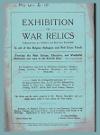Thomas McWhirr
Their names will be remembered for evermore
A century on, the bizarre exploits of amateur adventurer Thomas McWhirr read with comic disbelief. This ordinary, middle-aged civilian went on his own mission to collect souvenirs from the battlefields of the Western Front for an exhibition in Glasgow's McLellan Galleries, to raise money for the Red Cross and Belgian refugees living in Glasgow. McWhirr's story illustrates how much Glaswegians were prepared to help, despite their own meagre circumstances.
A Security Nightmare
With an air of plucky self-confidence, McWhirr made and survived three trips to the battlefields. He caused a security nightmare, as he ignored military orders and was frequently arrested as a spy. He eventually reached the front line to meet his son, who was serving with 2nd Battalion, The Highland Light infantry at Ypres. McWhirr was the uncle of the four McWhirr brothers, also in this history.
Less than three months after the start of the war, the Glasgow public had contributed over £200,000 to the Prince of Wales's National Relief Fund and another £200,000 to Belgian and armed service charities; staggering sums by the standards of the day. It was against this background that McWhirr decided to "do his bit".
Bizarre Adventures
His own accounts tell the story best. He refers to himself both in the third and first person, changing from "Mr MacWhirr" to "I" in one sentence to the next: "Mr MacWhirr ... made up his mind to cross to Paris after the British retreat from Mons ... in London and calling at Cooks, I was informed that they were closed and staff recalled from Paris. Got ticket to Paris ... I tried to get in touch with HLI. He spent three days trying to get the whereabouts of his son... Various curios from the battlefields were on view in some shops... it occurred to Mr MacWhirr that, if some could be exhibited in Glasgow, money could be raised."
Inspired, he returned home. He made a second trip, one he described as "an immense amount of trouble" to Ostend the day after a minefield was laid in the North Sea. On 4 October, 1914, he made his way to Antwerp where he noted: "The Germans being only eight and a half miles away. The boom of the guns was most distressing."
Two days later, he encountered Winston Churchill, then First Lord of the Admiralty, and other senior politicians as they emerged from a war conference at a hotel in the besieged city. McWhirr noted in his account: "They all saluted... Mr MacWhirr went forward and presented them all with sprigs of white heather which he had carried from Scotland, wishing them good luck."
Incredibly, McWhirr managed to re-cross the channel with a trunk of souvenirs and an exhibition, which had attracted prominent supporters including a former city councillor, was opened. Its success prompted McWhirr, in November 1914, to make a third trip to France.
Civilians had been banned from travelling beyond Calais, but McWhirr reached Boulogne and then, defying army orders, took a train to Hazebrouck. He wrote: "I had then to sit all night at the railway station, within sound of the guns. It was freezing, and with snow falling... patrols took me for a spy."
Father Meets Son on Front Line
McWhirr was eventually allowed to leave Hazebrouck, but instead of returning home, he hitched a ride on a military transport and later wrote of finding Ypres "in flames" when he arrived on the front line. In finding his son James, he noted the young man "could hardly believe his eyes".
The exhibition consisted of items including a Browning revolver, a German Hussar's helmet, cap badges, pieces of shrapnel and ammunition, a tin of tobacco with a bullet lodged and the railway station clock from Ypres. It appears to modern eyes as the meaningless debris of war. However, it captured the imaginations of thousands who were starved of information of what was happening, and desperate for news from the front.
McWhirr died in 1917, by which time the exhibition had toured Scotland and had raised over £50,000 in a hundred different venues.
View original referenced text here:Thomas McWhirr (PDF, 134 KB)(opens new window)
Images:
- Armoured train manned by Belgians and British during fight for Antwerp, October 1914. McWhirr reported the noise of the guns. Credit: The War Ilustrated, Vol 1, p185
- The cover of Thomas H McWhirr's fundraising Exhibition of War Relics. Credit: By permission of University of Glasgow Library, Special Collections. (Sp Coll Mu61-b.10)







